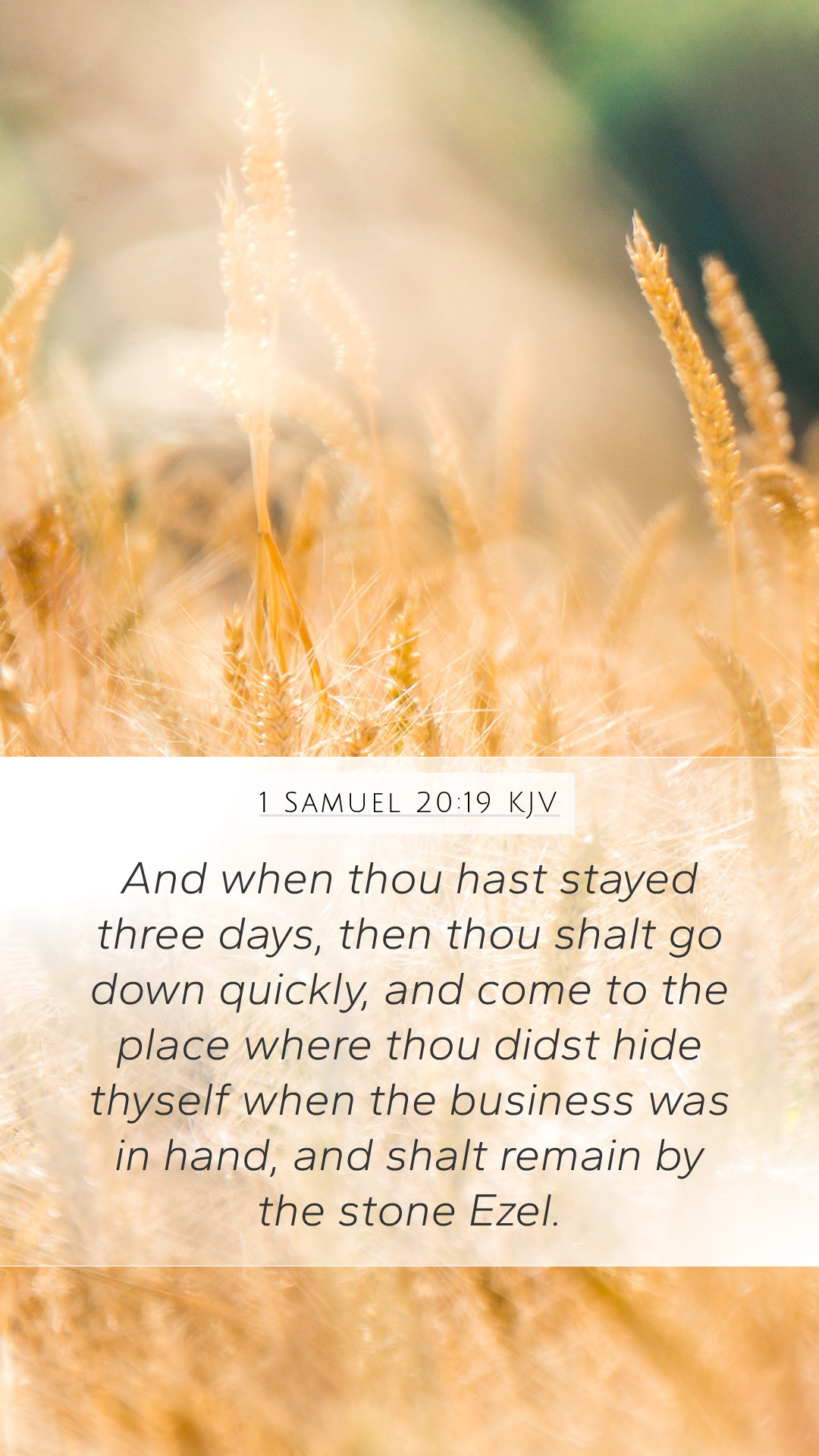Understanding 1 Samuel 20:19 - A Comprehensive Analysis
In the pursuit of Bible verse meanings, we turn our attention to 1 Samuel 20:19, which states:
"And when thou hast stayed three days, then thou shalt go down quickly and come to the place where thou didst hide thyself when the business was in hand, and shalt remain by the stone Ezel." (1 Samuel 20:19)
Context and Background
This passage emerges from a narrative involving two pivotal figures, David and Jonathan, during a time of rising tension and conflict between David and King Saul. Understanding this scripture requires an exploration of the historical and emotional context surrounding their friendship as well as the political intrigue of the time.
Insights from Commentaries
- Matthew Henry: Henry emphasizes the great bond of friendship between David and Jonathan, highlighting that this verse marks Jonathan's attempt to aid David amidst Saul’s growing jealousy. The instructions are practical, designed to secure David’s safety while demonstrating Jonathan’s loyalty.
- Albert Barnes: Barnes notes that the "stone Ezel" serves as a significant landmark for David's refuge. His commentary suggests that this verse reflects the importance of communication and strategy in their friendship, suggesting an underlying theme of trust and faithfulness even in dire circumstances.
- Adam Clarke: Clarke elaborates on the implication of “three days," symbolizing a period of waiting and preparation. He posits that this timeline not only served tactical purposes but also reflects a deeper spiritual preparation, portraying the waiting period as a metaphor for patience and divine timing.
Detailed Scripture Analysis
Examining 1 Samuel 20:19 through the lens of Biblical exegesis reveals layers of meaning:
1. The Importance of Time
The mention of "three days" embodies a sense of urgency but also of caution. It reflects a necessity for thoughtful action in the face of peril. This insistence on timing resonates with broader biblical themes where waiting often precedes divine intervention.
2. The Role of the Stone Ezel
The "stone Ezel" becomes a symbol of safety and a provision for the future. In biblical narratives, stones often carry significant meanings, representing steadfastness, divine promise, and continuity.
3. Loyalty and Friendship
This verse encapsulates the essence of loyal friendship. Jonathan's commitment to David, as expressed in the verse, serves as a crucial model for understanding Bible study insights into relationship dynamics, particularly in the context of faith and shared belief amidst adversity.
Key Themes and Applications
From 1 Samuel 20:19, we can derive several key themes relevant today:
- Patience in Trials: The scripture encourages believers to practice patience, waiting on God’s timing in their challenges.
- Friendship and Loyalty: The example of Jonathan and David teaches the importance of steadfastness and support in relationships.
- Strategic Planning: The practical advice given highlights the necessity of preparation and foresight when facing difficult situations.
Cross References
For a fuller understanding, this verse can be cross-referenced with:
- 1 Samuel 18:1-4 - Highlights the deep bond between David and Jonathan.
- Psalm 11:1 - Reflects themes of safety and refuge, resonating with David’s flight.
- Proverbs 17:17 - Affirms the value of faithful friends in times of trouble.
Conclusion
In summary, 1 Samuel 20:19 serves as a profound reminder of loyalty, strategic action, and the importance of timing in God’s plans. Through a combination of Bible verse interpretations and practical insights, this passage contributes significantly to our understanding Scripture and the relational dynamics depicted in the Bible.
As we delve into the meaning of Bible verses like this, we find not only historical significance but also applicable lessons for contemporary faith journeys.


